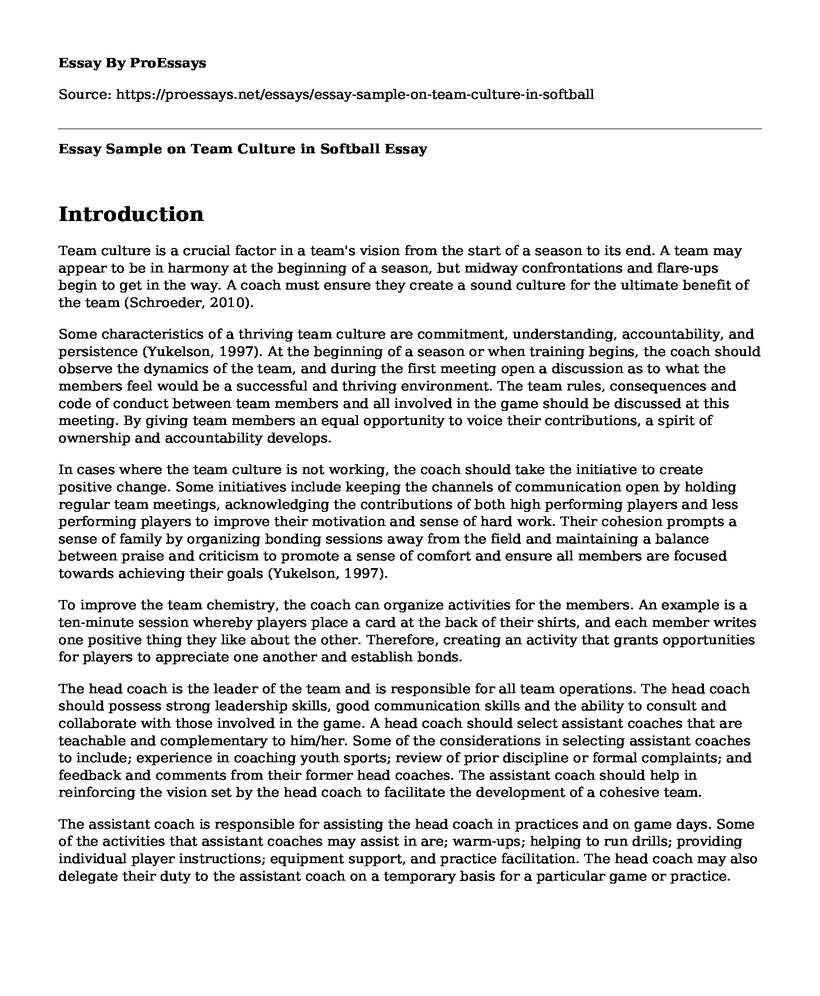Introduction
Team culture is a crucial factor in a team's vision from the start of a season to its end. A team may appear to be in harmony at the beginning of a season, but midway confrontations and flare-ups begin to get in the way. A coach must ensure they create a sound culture for the ultimate benefit of the team (Schroeder, 2010).
Some characteristics of a thriving team culture are commitment, understanding, accountability, and persistence (Yukelson, 1997). At the beginning of a season or when training begins, the coach should observe the dynamics of the team, and during the first meeting open a discussion as to what the members feel would be a successful and thriving environment. The team rules, consequences and code of conduct between team members and all involved in the game should be discussed at this meeting. By giving team members an equal opportunity to voice their contributions, a spirit of ownership and accountability develops.
In cases where the team culture is not working, the coach should take the initiative to create positive change. Some initiatives include keeping the channels of communication open by holding regular team meetings, acknowledging the contributions of both high performing players and less performing players to improve their motivation and sense of hard work. Their cohesion prompts a sense of family by organizing bonding sessions away from the field and maintaining a balance between praise and criticism to promote a sense of comfort and ensure all members are focused towards achieving their goals (Yukelson, 1997).
To improve the team chemistry, the coach can organize activities for the members. An example is a ten-minute session whereby players place a card at the back of their shirts, and each member writes one positive thing they like about the other. Therefore, creating an activity that grants opportunities for players to appreciate one another and establish bonds.
The head coach is the leader of the team and is responsible for all team operations. The head coach should possess strong leadership skills, good communication skills and the ability to consult and collaborate with those involved in the game. A head coach should select assistant coaches that are teachable and complementary to him/her. Some of the considerations in selecting assistant coaches to include; experience in coaching youth sports; review of prior discipline or formal complaints; and feedback and comments from their former head coaches. The assistant coach should help in reinforcing the vision set by the head coach to facilitate the development of a cohesive team.
The assistant coach is responsible for assisting the head coach in practices and on game days. Some of the activities that assistant coaches may assist in are; warm-ups; helping to run drills; providing individual player instructions; equipment support, and practice facilitation. The head coach may also delegate their duty to the assistant coach on a temporary basis for a particular game or practice.
Conclusion
A team's vision could be winning the state championship. The vision should be accompanied by goals, both short term and long term goals with assigned timelines. A one-year roadmap could be drafted, indicating all the stages of the game, that is, conditioning, practice, season start, regionals, sectionals and the state championships. Availability of a roadmap and a favorable environment for team members will ensure attainment of their vision.
Team culture can break or make a season. A coach who understands the importance of team culture and intentionally puts effort into creating a positive culture is bound to have a successful and stable team.
References
Schroeder, P. J. (2010). Changing team culture: The perspectives of ten successful head coaches. Journal of Sports Behavior, 33(1), 63.Yukelson, D. (1997). Principles of effective team building interventions in sport: A direct services approach at Penn State University. Journal of Applied Sports Psychology, 9(1), 73-96.
Cite this page
Essay Sample on Team Culture in Softball. (2022, Apr 01). Retrieved from https://proessays.net/essays/essay-sample-on-team-culture-in-softball
If you are the original author of this essay and no longer wish to have it published on the ProEssays website, please click below to request its removal:
- Physical Education Essay: Coach is Responsible for 50 Percent of Athletic Success
- General Fitness: Physical Activity and Psychological Well-Being Annotated Bibliography
- Program Development for Basketball Athletes Paper Example
- Research Paper on European Game of Football
- Research Paper on Motivation of Athletes
- Essay Sample on Student-Athletes: The Powerhouses of the Sports Industry
- Case Study Sample on Nurse Neglect Leads to Footballer's Injury







